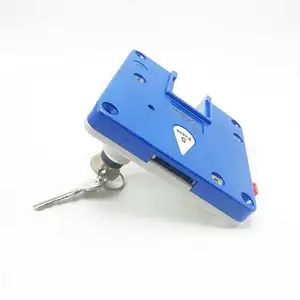Introduction to Locking Devices for Doors
Locking devices for doors are essential hardware components that provide security and peace of mind to homes and businesses alike. These devices serve as the first line of defense against unauthorized access and potential intruders. With advancements in technology, modern locking systems offer enhanced features, durability, and easy usability, making them suitable for various door types and environments.
Types of Locking Devices for Doors
There is a wide range of locking devices available in the market, each designed to meet specific security needs and preferences. Some common types include:
- Deadbolts: These are robust locking devices that require a key or thumb turn to operate, providing superior strength against forced entry.
- Lever Handle Locks: Typically found in residential and commercial buildings, these locks leverage a handle mechanism for easy operation.
- Electronic Locks: Incorporating advanced technology, these locks can be operated using keypads, biometrics, or smartphone applications, offering convenience without physical keys.
- Smart Locks: A step further into the digital age, smart locks allow users to control access remotely, monitor entry points, and even integrate with home automation systems.
- Mortise Locks: Often used in commercial buildings, these locks are installed within a pocket cut into the door, providing strength and durability.
Functionality and Features of Locking Devices for Doors
The functionality of locking devices goes beyond mere access control. Here are some key features that enhance their performance:
- Pick Resistance: High-quality locks are designed to thwart picking attempts, featuring complex internal mechanisms.
- Key Control: Some locking systems offer restricted keys to prevent unauthorized duplication, enhancing overall security.
- Weather Resistance: For outdoor installations, certain locks are crafted from weatherproof materials to withstand harsh climatic conditions.
- Integration with Security Systems: Many locking devices can be connected to existing security systems, allowing for comprehensive monitoring and alerts.
- User Management: Electronic and smart locks often come with features that enable users to set permissions for different individuals, making them ideal for shared spaces.
Applications of Locking Devices for Doors
Locking devices for doors are versatile and can be applied in various scenarios, each requiring specific features to ensure security. Here are some common applications:
- Residential Use: Homeowners utilize locking devices for front doors, back doors, and garages to protect their families and belongings.
- Commercial Buildings: Businesses often implement advanced locking systems on main entry points and sensitive areas to secure valuable assets and confidential information.
- Industrial Settings: Warehouses and factories require heavy-duty locks that can withstand frequent use and physical stress.
- Educational Institutions: Schools and universities utilize locking devices to ensure student safety while allowing authorized access for staff.
- Healthcare Facilities: Hospitals and clinics need locking solutions that guarantee the safety of patients and sensitive medical supplies.
Advantages of Locking Devices for Doors
Investing in high-quality locking devices comes with numerous benefits that enhance security and convenience:
- Increased Security: Well-designed locks significantly reduce the risk of unauthorized access and theft.
- Diverse Options: With the variety of locking devices available, one can easily find a solution tailored to specific security needs.
- Durability: High-quality materials ensure longevity and consistent performance under various conditions.
- User Convenience: Features like keyless entry and remote access improve ease of use while maintaining security.
- Peace of Mind: Knowing your property is secure helps alleviate concerns about personal safety and asset protection.















































